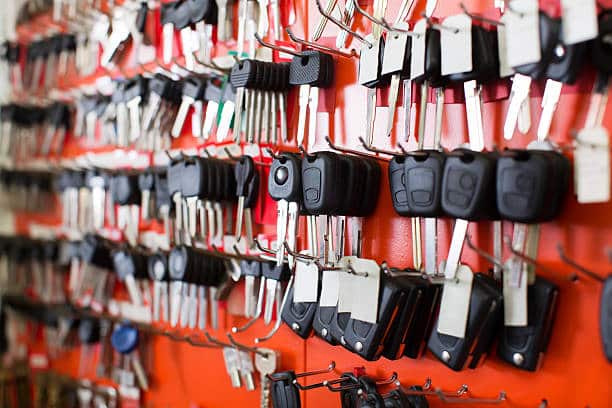When it comes to car keys, technology has come a long way. Gone are the days of simple metal keys that would unlock your car with a twist. Nowadays, car keys come equipped with transponder chips, a small electronic device that adds an extra layer of security to your vehicle. In this article, we will explore the different types of transponder chips for car keys, from basic to advanced options, and discuss their pros and cons. Whether you’re a car enthusiast or simply curious about the technology behind car keys, this article will provide you with a comprehensive overview of the types of car key transponder key chips.
How do car key transponder chips work?
Before diving into the different types of transponder chips, it’s important to understand how they work. A car key transponder chip is a small device that communicates with your car’s immobilizer system. When you insert the key into the ignition, the transponder chip sends a unique code to the immobilizer. If the code matches the one programmed in the car’s system, the engine will start. This system adds an extra layer of security, as it prevents the car from being started with a duplicate or unauthorized key.
Different types of car key transponder chips
Basic transponder chips
Basic transponder chips are the most common type found in car keys today. These chips are relatively simple and use a fixed code that is programmed into the car’s immobilizer system. When the key is inserted into the ignition, the immobilizer reads the code from the chip and verifies it before allowing the engine to start. Basic transponder chips provide a basic level of security, but they can be vulnerable to hacking or code-grabbing devices.
Advanced transponder chips
Advanced transponder chips, also known as rolling code or encrypted chips, offer a higher level of security compared to basic chips. Instead of using a fixed code, these chips generate a new code each time the key is used. The code is synchronized between the key and the car’s immobilizer system, ensuring that only the correct key can start the engine. This rolling code technology makes it extremely difficult for hackers to replicate or intercept the code, providing enhanced protection against car theft.
Pros and cons of different types of transponder chips
When it comes to choosing the right transponder chip for your car key, it’s important to consider the pros and cons of each type.
Basic transponder chips are widely available and less expensive compared to their advanced counterparts. They offer a basic level of security and are compatible with most car models. However, they are more susceptible to hacking and code-grabbing devices.
On the other hand, advanced transponder chips provide a higher level of security due to their rolling code technology. They are more difficult to hack and replicate, making them a preferred choice for those looking for enhanced protection against car theft. However, they tend to be more expensive and may require specialized programming equipment for replacement or duplication.
How to choose the right transponder chip for your car key
Choosing the right transponder chip for your car key depends on several factors. First, consider the make and model of your car. Some car manufacturers have specific requirements for transponder chips, so it’s important to choose a chip that is compatible with your vehicle.
Next, consider your security needs. If you live in an area with a high car theft rate, investing in an advanced transponder chip with rolling code technology might be a wise decision. However, if you have an older car or live in a relatively safe neighborhood, a basic transponder chip may offer sufficient security at a lower cost.
Lastly, consult with a professional locksmith or car dealership to ensure you choose the right transponder chip for your car. They have the expertise and knowledge to guide you through the selection process and provide you with the necessary programming and replacement options.
Transponder chip programming and replacement options
Once you have chosen the right transponder chip for your car key, you will need to have it programmed and replaced if necessary. Programming a transponder chip involves synchronizing it with your car’s immobilizer system. This process requires specialized equipment and knowledge, so it’s recommended to seek professional help to ensure proper programming.
If your car key transponder chip gets damaged or lost, you may need to replace it. In such cases, it’s important to consult with a professional locksmith or car dealership. They can provide you with the necessary replacement chip and program it to work with your car’s immobilizer system.
Common issues with car key transponder chips and troubleshooting tips
While car key transponder chips are generally reliable, they can encounter issues from time to time. Here are some common problems and troubleshooting tips:
- Key not starting the car: If your key is not starting the car, it could be due to a weak battery in the transponder chip. Try replacing the battery and see if that solves the issue.
- Intermittent starting issues: If you experience intermittent starting issues, it could be a sign of a faulty transponder chip or a loose connection. Consult with a professional to diagnose and resolve the problem.
- Unable to program the transponder chip: If you’re having trouble programming the transponder chip, ensure that you’re using the correct programming procedure and compatible equipment. If the issue persists, seek professional assistance.
Conclusion
Car key transponder chips have revolutionized the way we secure our vehicles. From basic to advanced options, these chips offer different levels of security and peace of mind. When choosing the right transponder chip for your car key, consider factors such as compatibility, security needs, and professional guidance. Remember to consult with a locksmith or car dealership for programming and replacement options. By understanding the different types of car key transponder chips and their pros and cons, you can make an informed decision to protect your vehicle.
Frequently Asked Questions
1. Can I program a transponder chip myself?
Programming a transponder chip requires specialized equipment and knowledge. It is best to seek professional help to ensure proper programming.
2. Are all car keys equipped with transponder chips?
No, not all car keys come equipped with transponder chips. Older car models may still use traditional metal keys without transponder technology.
3. Can a transponder chip be deactivated or reprogrammed?
Transponder chips can be reprogrammed or deactivated by a professional locksmith or car dealership. This is typically done when you need to replace a lost or damaged key.
4. What should I do if my transponder chip gets wet?
If your transponder chip gets wet, dry it thoroughly before attempting to use it. If the chip is damaged or not working properly, consult with a professional for repair or replacement.
5. Can a transponder chip be duplicated?
Transponder chips are difficult to duplicate due to their unique coding and rolling code technology. However, a skilled hacker can replicate a transponder chip. It is important to choose a chip with advanced security features to minimize the risk of unauthorized duplication.


